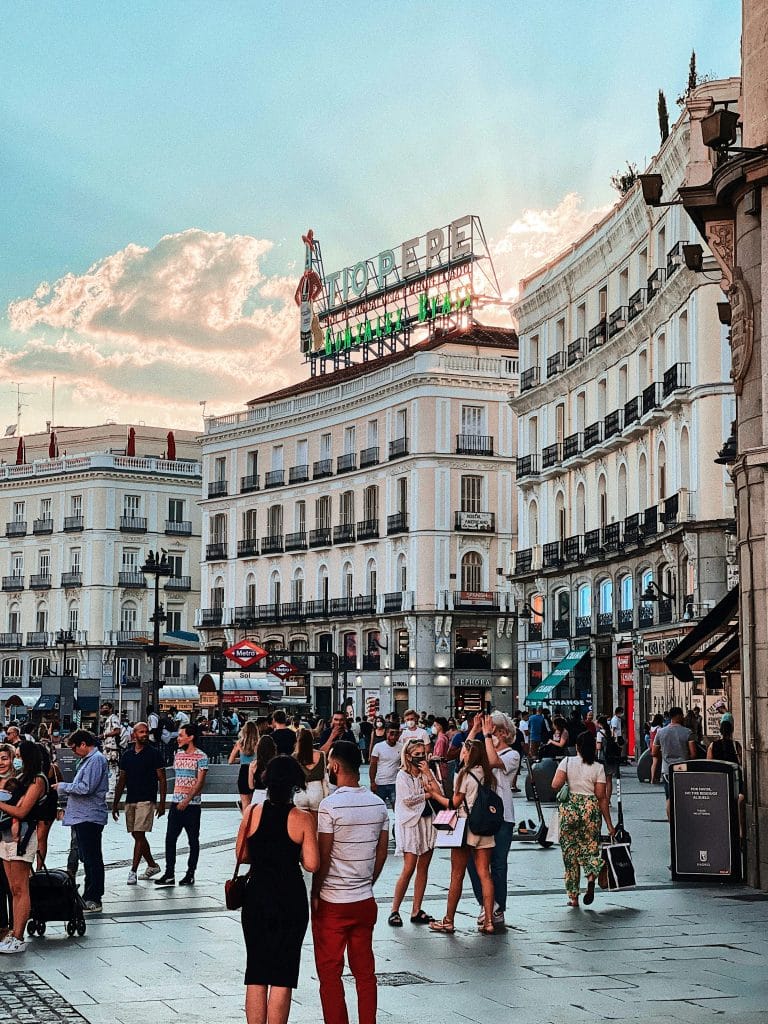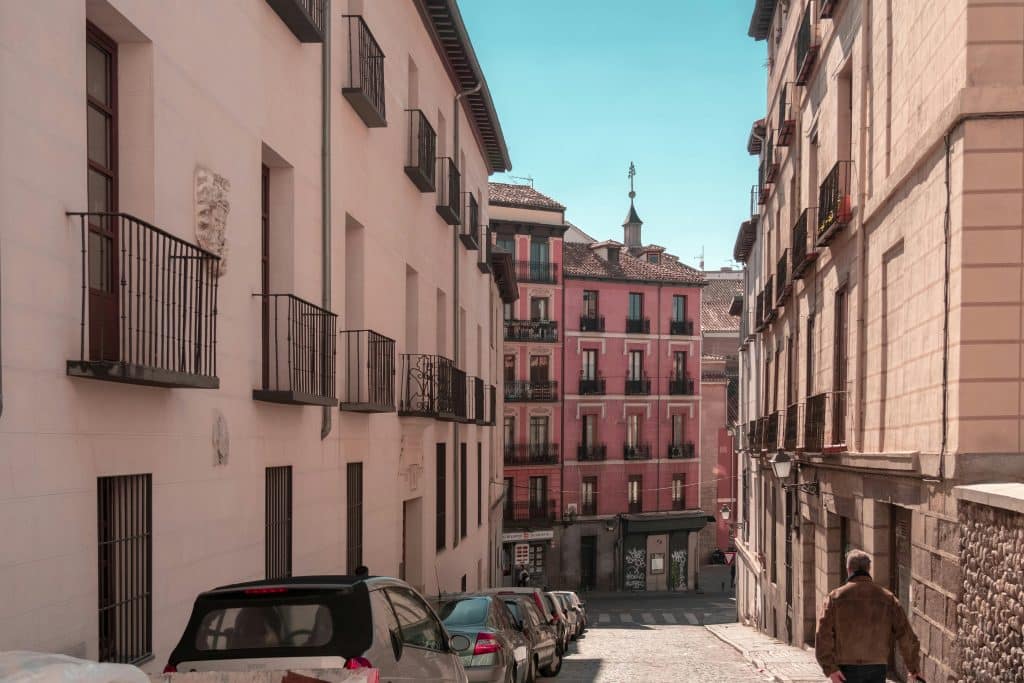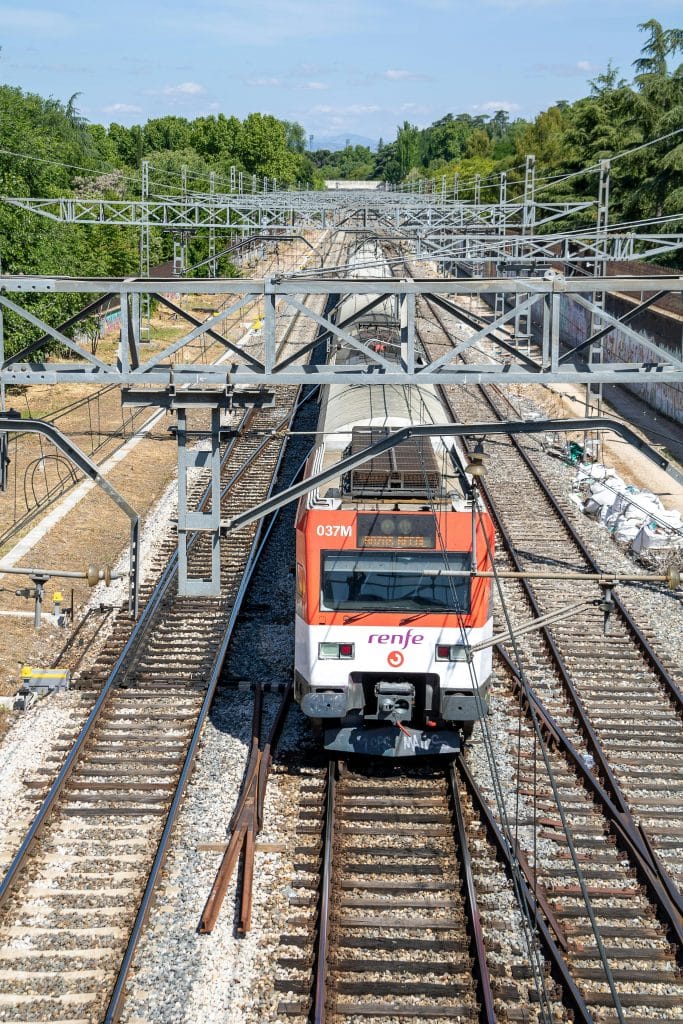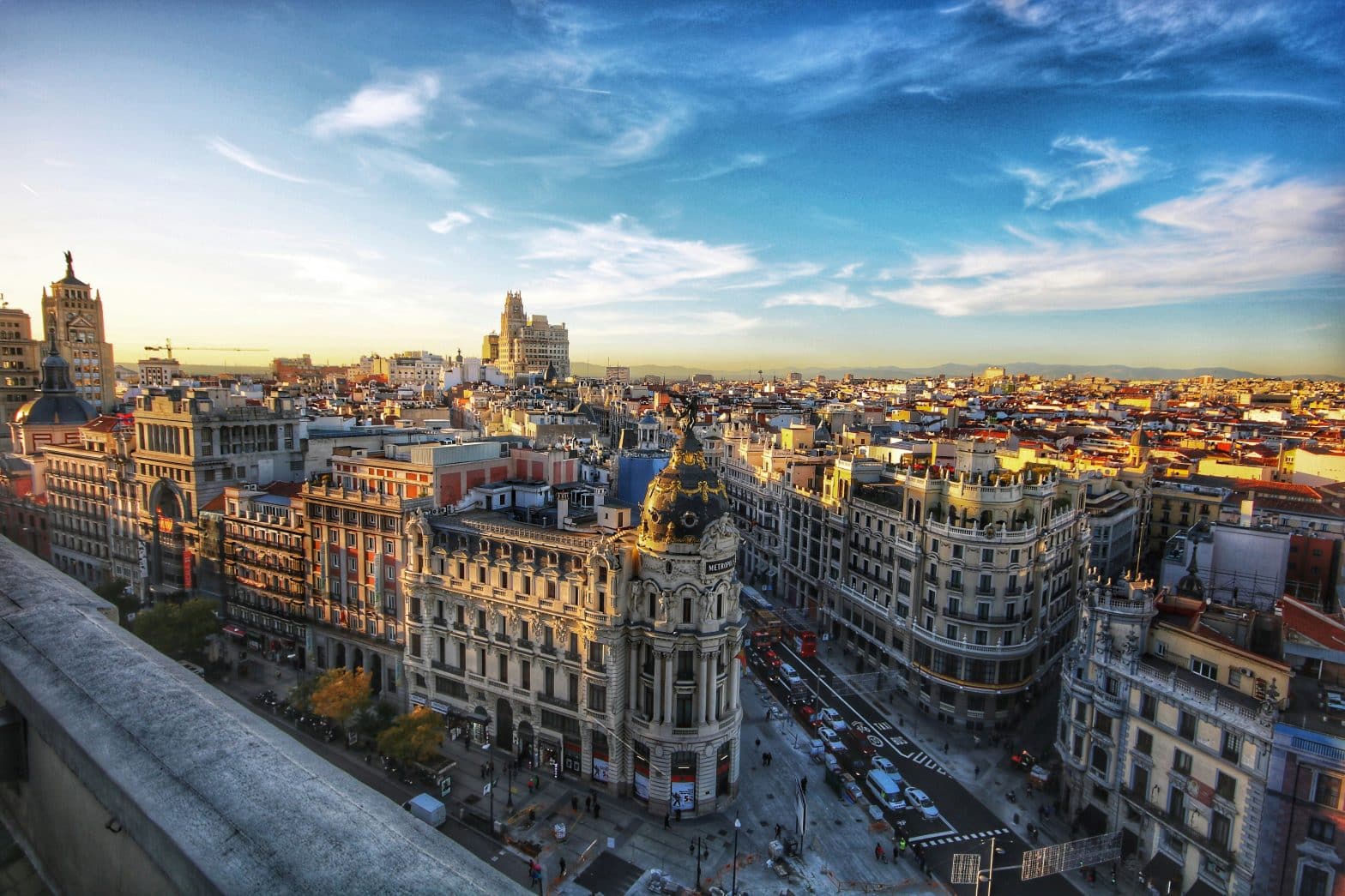Why do so many expats choose Madrid? A cosmopolitan capital, economic dynamism, a lively social scene, a high-quality education system… there are many answers to this question, and they all illustrate the unique character of the city.
Are you planning to move to Madrid, alone or with your family? Here is a comprehensive guide to help you settle in successfully, covering the procedures, housing, work and health!
Living in Madrid: pros and cons
The pros
- Spain’s economic powerhouse
- One of the sunniest capitals in Europe
- A lifestyle typical of Madrid culture, with the ‘hora del almuerzo’ (the famous lunchtime) which can last up to 2 hours, the afternoon ‘siesta’ and the morning cafés con leche
- A lower cost of living than in other neighbouring capitals
- A warm and welcoming population
- A language often studied at secondary school and fairly accessible to English speakers
The Cons
- The cost of housing is on the rise
- Very hot summers (up to 40°C during heatwaves)
- The city is far from the sea

Administrative procedures for living in Madrid
As a French or European Union citizen, you do not need a visa to move to Spain. However, there are two mandatory administrative formalities when you move to Madrid:
1. Submit an application for a Certificado de Registro de Ciudadanos Miembros de la Unión
To live in Spain for more than 3 months, you must obtain the Certificado de Registro de Ciudadanos Miembros de la Unión (EU citizen registration certificate). This document is mandatory for all your administrative procedures in Spain.
To obtain it, you must make a cita previa (appointment) at the Madrid police station via the dedicated website of the Spanish government.
This procedure cannot be done online, so remember to make an appointment before you move abroad or within 3 months of your arrival in Spain.
At the end of the procedure, you will also obtain an NIE (Numéro d’Identification d’Étranger), which is compulsory for many formalities (opening a bank account, purchasing property, taxation, etc.).
Please note: the NIE is valid for a period of 5 years and is renewable.

2. Empadronamiento, to register as a resident of the city
Once you have found accommodation or settled in, the second step is to register with the Madrid town hall. Empadronamiento or ‘padrón’ is compulsory for both expats and Spaniards.
To do this, you must go to the town hall with your identity card and proof of your residential address.
Finding accommodation in Madrid
Madrid is a huge city, and the rental market offers a lot of accommodation, although some neighbourhoods are saturated due to high demand.
You can start by looking for accommodation in Madrid on Spanish property websites, including:
- Idealista
- Fotocasa
- Indomio.es
- Spotahome (property website specialising in medium to long-term rentals)
If you live in France, consider the option of spending a few days in Spain to visit properties and find accommodation before you move.
Neighbourhoods to prioritise
There isn’t a dedicated “English Quarter” in Madrid, but certain areas are popular with British expats. The neighborhoods with the highest concentration of Brits include:
Chamartín – Especially El Viso: A well-off area with international schools, embassies, and a mix of expats, including Brits. El Viso is particularly sought after by professionals and families.
Salamanca: One of Madrid’s most exclusive districts, Salamanca attracts expats looking for upscale living, luxury shopping, and fine dining. While not British-dominated, it’s a favorite for wealthier expats.
Chamberí: A charming, traditional neighborhood with a mix of locals and foreigners, including many British professionals and retirees. It’s known for its elegant architecture and relaxed vibe.

Moncloa & Aravaca: Popular with international students and families due to its proximity to universities and good schools. There are many British expat families in Aravaca, which has a more suburban feel.
Pozuelo de Alarcón (Just Outside Madrid): A wealthy suburb where many British families live, mainly because of the British Council School, one of the top international schools in Spain.
For British pubs, shops, and a community feel, areas around Sol, Huertas, and Malasaña have a mix of British expats and visitors, with pubs like O’Connell St., James Joyce, and The Irish Rover catering to the crowd..
The budget to be planned for accommodation

The cost of housing in Madrid is among the highest in Spain, along with Barcelona.
For a studio apartment in the city centre, expect an average monthly rent of 1,000 to 1,700 euros. In the outlying districts, the budget is 800 to 1,200 euros.
For a three-bedroom apartment, a family should budget for a rent of 1,800 to 3,000 euros per month in the centre of Madrid, compared with 1,200 to 2,000 euros in the surrounding areas.
If you want to become a homeowner, the average price per square metre is 3,800 to 6,550 euros.
The cost of living in Madrid
Madrid is one of the most expensive cities in Spain, along with Barcelona. However, life in Madrid is still more affordable than in other European capitals, such as Paris (35% more expensive) or London (60% more expensive).
If you are interested in the subject or are undecided about other Spanish cities, check out our guide on the cost of living in Spain.
The main expenses to plan for
An expat living alone in Madrid should budget for an average of 1,930 euros per month. A family of four should budget for around 5,000 euros.
These averages take into account the main items of expenditure:
● Housing and energy costs
● Groceries
● Healthcare
● Schooling
● Transport
● Entertainment and leisure

What salary do you need to live well in Madrid?
According to the National Institute of Statistics, the current average salary in Madrid is slightly over 2,500 euros per month.
This salary is enough to live well alone or with a partner in the capital, but it all depends on your consumption habits. If you move to an upmarket neighbourhood with high rents, you will need a higher salary.
Getting around the Spanish capital
Madrid has a very comprehensive public transport network (metro, bus, trams, etc.).
To take the metro, you need to buy the Tarjeta Multi (rechargeable card), as paper tickets no longer exist in the city. To top up your card, simply download the Tarjeta Transporte app and link your bank account to it.
If you use public transport regularly and travel on several lines, you can get the Abono travel card, which is valid for 30 days and can be renewed.
After Brexit, the UK and Spain signed an agreement allowing UK license holders to drive in Spain and exchange their licenses without a test, but this only applies if the exchange is done within six months of obtaining Spanish residency!

Moving to Madrid with your family
Quality of life, safety, education, cultural activities… Madrid offers a pleasant living environment for families. Its many green spaces and international schools make it a city where young and old can thrive.
Schooling and education
Parents who have moved to Madrid can enrol their children in public, semi-private or private schools. The Spanish education system is ranked 28th in the world in terms of quality, and all schools offer at least bilingual education (Spanish-English).

There are also several English-speaking schools in the city, such as:
- Hastings School – A well-established British school with multiple campuses around Madrid.
- The British Council School – One of the oldest and most prestigious British schools in Spain, following the UK National Curriculum.
- King’s College, The British School of Madrid – Offers education from nursery to A-Levels, consistently ranking among the top international schools.
- Runnymede College – A highly academic, selective British school with strong exam results and a traditional approach.
Other English-Speaking Schools: If you’re interested in an American or international curriculum, you might consider:
- American School of Madrid (ASM) – Follows the U.S. curriculum with IB options.
- International College Spain (ICS) – Offers the IB (International Baccalaureate) program in English.
- The English Montessori School (TEMS) – A mix of the British curriculum and Montessori methodology.
Leisure and activities
With more than 50 museums, 40 natural areas and numerous amusement parks, Madrid is teeming with activities for the whole family. Expatriates can give their children a wonderful experience by visiting the Museum of Illusions, spending a day at the Warner Madrid theme park or going to the Zoo Aquarium (a favourite with children)!
Working in Madrid
If you are a European citizen and have your NIE, you can work in Spain without needing a work permit. But if you are a UK citizren, unless you have Spanish residency status under the Brexit Withdrawal Agreement, you will need a work visa to be employed in Madrid.
Types of Work Visas for Brits in Spain
Highly Skilled Worker Visa (EU Blue Card) – For professionals with a high salary and advanced qualifications.
Employee Work Visa (Trabajo por cuenta ajena) – If you have a job offer from a Spanish employer, they must sponsor your application.
Self-Employed Visa (Autónomo Visa) – If you want to freelance or start a business, you must prove financial stability and submit a business plan.
Digital Nomad Visa – A new option for remote workers employed by non-Spanish companies, offering tax benefits.

Work Permit Application Process
- Secure a job offer – Your Spanish employer must initiate the work visa process.
- Employer submits the application – They apply for a work permit on your behalf via Spain’s Ministry of Inclusion, Social Security, and Migration.
- Wait for approval – Processing times vary, but it typically takes 1-3 months.
- Apply for a work visa at a Spanish consulate in the UK – Once the work permit is granted, you must apply for a visa to enter Spain.
- Get your NIE & residence card – Once in Madrid, you must register for a Foreigner Identity Number (NIE) and obtain your TIE residency card.
If you hold dual nationality (e.g., an Irish passport), you can work freely under EU rules. If you’re in Spain on a tourist visa, you cannot work legally.
Madrid is establishing itself as the Spanish financial and economic centre, reflecting the country’s current growth. The labour market is favourable to qualified expatriates, especially those who have a good command of Spanish, or at least English. In Madrid, some sectors recruit more than others, including:
● Technology and IT
● Healthcare
● Finance
● Wholesale and retail trade
● Education
Are you looking for a job in Madrid? Feel free to look at the job offers available online on specialised sites (JobMadrid, JobToday, etc.).
Getting healthcare in Madrid
How the Spanish healthcare system works
The Spanish healthcare system is based on universal health insurance for all residents of the country, both natives and expatriates. This cover is financed by taxes and mainly covers care provided in public hospitals as well as medical consultations.
Among the best spanish hospitals are:
● La Paz University Hospital
● Ramón y Cajal University Hospital
● Moncloa University Hospital

Opt for private health insurance
Taking out private health insurance is recommended for expats. It allows you to avoid the queues in the Spanish public health system and to benefit from high-quality private medical facilities.
Foyer Global Health, a specialist in international private health insurance for expats, offers you tailor-made coverage:
- Insurance for you and your family, valid in Spain and anywhere in the world
- Assistance available 24/7 in case of emergency
- Unlimited access to medical teleconsultation for a second opinion
- Complementary wellness services, such as a fitness programme and mental health coaching, because expatriation can have its challenges.
